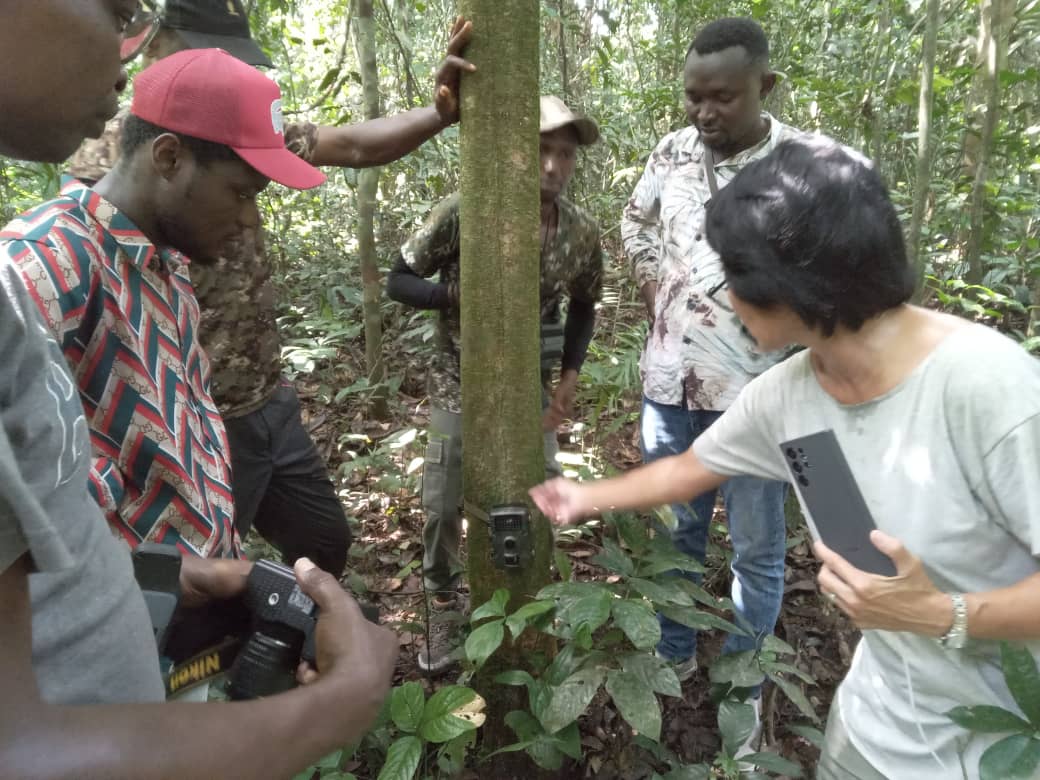By CrossRiverWatch Admin
As part of the Nigerian Conservation Foundation’s (NCF) effort to contribute to the protection of threatened species in Cross River State and Nigeria, the Foundation has collaborated with the Wilder Institute, a science-based conservation organization, to donate some equipment to some of its partners – Cross River National Park, Cross River Forestry Commission, and University of Calabar.
The gesture is to boost the ongoing research project on the conservation and preservation of the Cross River gorilla (Gorilla gorilla diehli).
The equipment includes digital cameras, desktop computers, laptops, projector, and screen; video conferencing gadget, 65-inch flat screen Hi-sense TV, 4K PTZ professional Video Conference Camera, MC3000 USB HD PTZ Auto Rotate Tracking Voice Camera. Built-in 4 digital microphone array and 10-meter voice pickup.
It also includes a 2.2 million pixels 1/2.8″ HD color CMOS sensor, 1920×1080 HD display, walkie-talkie, still cameras for project partners, GPS handsets, and drones. Items such as the television and computer equipment will support video conferencing for remote steering committee meetings at the University of Calabar while the GPS, camera traps, drones, and other camera equipment will support the student research projects.
The Cross River Gorilla Initiative commenced in 2022 and will award scholarships to 1 Ph.D. student and 4 master’s degree students at the University of Calabar for the period of 5 years and so far, the first set of awardees; one Ph.D. and two M.Sc. students all of the Department of Forestry and Wildlife Management, University of Calabar have resumed their three months internship program with NCF with the following objectives:
“To have practical hands-on experience in the use of field equipment such as camera traps, GPS handsets, drones, etc. in data collection and monitoring as well as maintenance of such equipment.
“Understand how to conduct field surveys with respect to Focal Group Discussions (FGD), Key Informant Interviews (KII), Participatory Rural Appraisals (PRA), and Community Work Skills (CWS), as well as strategies for developing, distributing, and collecting of questionnaires for effective research work and analysis.
Also, “Understand the need/importance for community engagement and community relationships with respect to data collection and field research work.
“To establish contact/familiarize themselves with the project community and project locations through field visits to ensure a smooth take-off during their field research work.
“To understand the role of gender in forest resource management with reference to gorilla conservation.”
As part of the activities to achieve the project goals, NCF organized a 2-day training on gender and conservation that was held recently in UNICAL with the objective to provide a robust understanding of the importance of gender in the conservation of the Cross River gorilla and its applicability to their field research work as a guide to the development of research instruments.
The workshop was facilitated by Dr. Mary Liao, Senior Advisor, Community Conservation at the Wilder Institute, and co-facilitated by Dr. Brenda Akpan, a gender specialist from the University of Calabar.
Cross River gorilla is viewed as a critically endangered subspecies of the western gorilla.
According to the facilitators, they are endemic to West Africa and live in small areas of highland forest that span the border of Nigeria and Cameroon.
“Now, more than ever before, the Cross River gorilla faces threats associated with habitat loss and hunting. It is estimated that there are at most 300 Cross River gorillas left in the wild. NCF continues to work with its partners to mobilize stakeholders and muster support to preserve the remaining population and their habitat to prevent the extinction of the gorilla in Nigeria.
“To learn more about the Cross River Gorilla Initiative, visit wilderinstitute.org.”
Since You Are Here, Support Good JournalismCrossRiverWatch was founded on the ideals of deploying tech tools to report in an ethical manner, news, views and analysis with a narrative that ensures transparency in governance, a good society and an accountable democracy. Everyone appreciates good journalism but it costs a lot of money. Nonetheless, it cannot be sacrificed on the altar of news commercialization. Consider making a modest contribution to support CrossRiverWatch's journalism of credibility and integrity in order to ensure that all have continuous free access to our noble endeavor. CLICK HERE |
New Feature: Don't miss any of our news again.Get all our articles in your facebook chat box.Click the Facebook Messenger Icon below to subscribe now
Text Advert by CRWatch :Place Yours
Will You To Learn How To Make Millions Of Naira Making Special Creams From Your Kitchen?.Click Here
Expose Your Business And Make More Sales. Advertise On CrossRiverWatch.com Today

